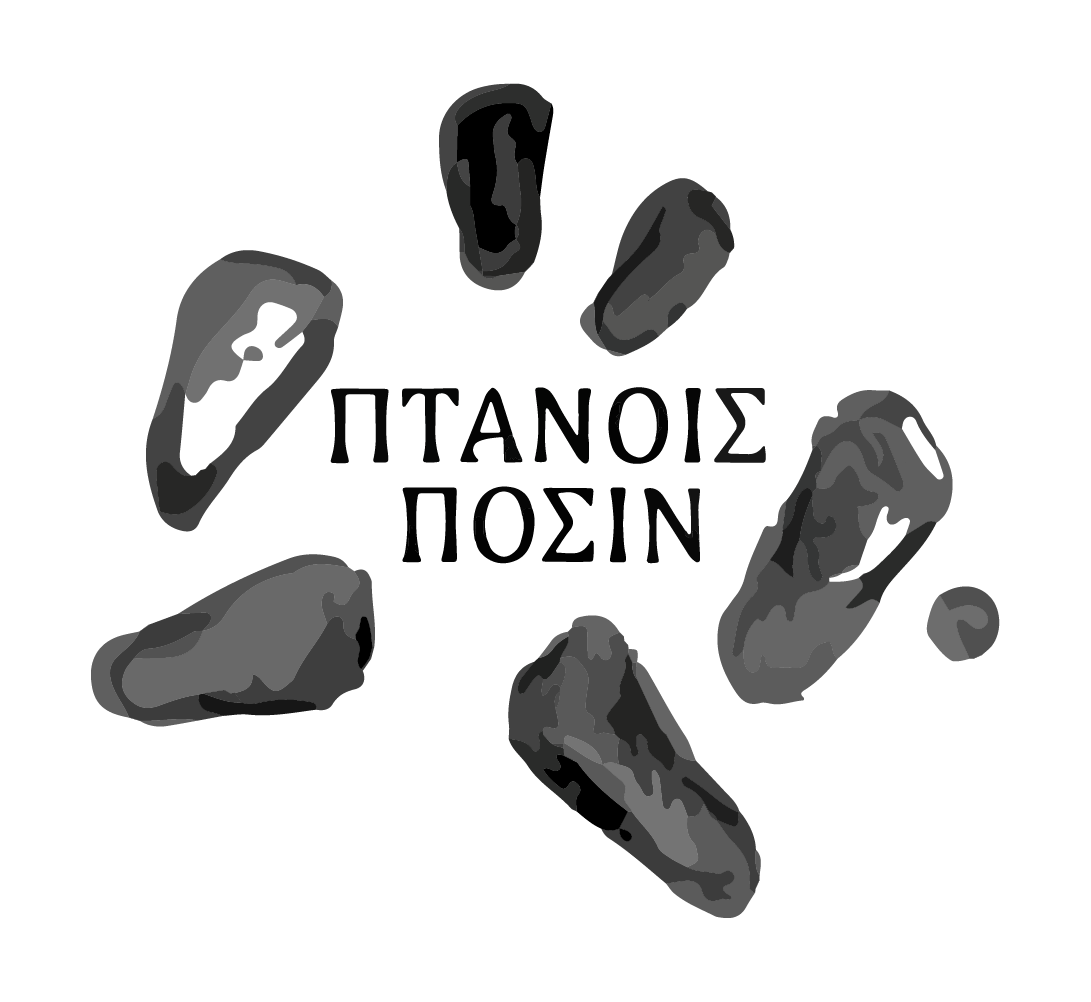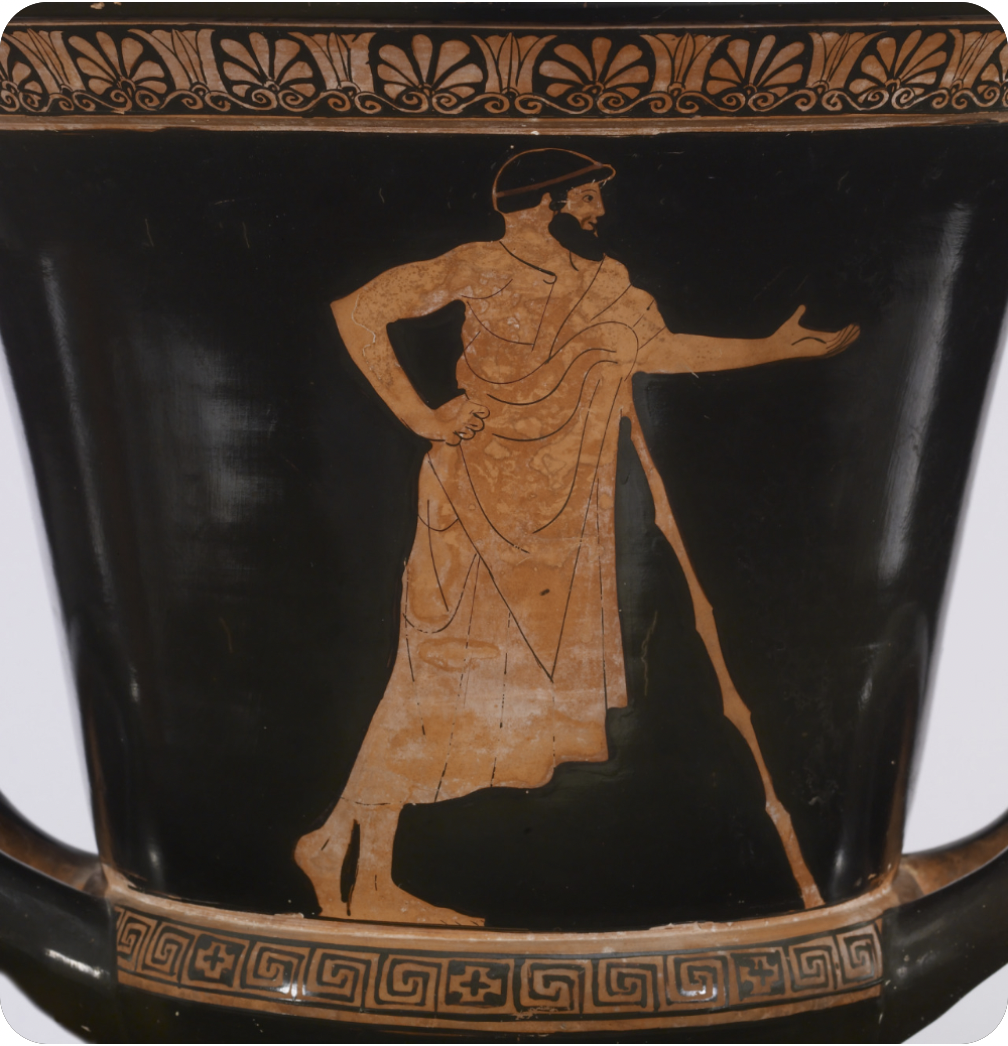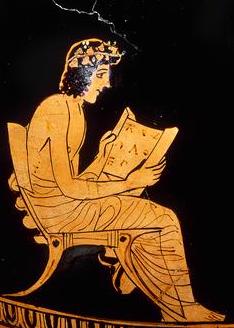ID 1512
Dioskourides of Tarsos, the son of Dioskourides by birth, and of Asklepiodoros by adoption: γραμματικός and poet
Myrinos of Amisos, the son of Dionysios: epic and lyric poet, Dioskourides’ pupil
Date:
end of the 2nd century BC
Edition:
ἔδοξεν Κνωσίων τοῖς κόσμοις καὶ τᾶι πόλι· ἐπειδὴ
Διοσκουρίδης Διοσκουρίδου, καθ’ ὑοθεσίαν δὲ Ἀσκλη-
πιοδώρου Ταρσεύς, γραμματικός, διὰ τὰν εὔνοιαν ἃν
ἔχει πορτὶ τὰν ἁμὰν πόλιν συνταξάμενος ἐ[γκ]ώ-
5 μιον κατὰ τὸν ποιητὰν ὑπὲρ τῶ ἁμῶ ἔθνιος, ἀπήστελ-
κε Μυρῖνον Διονυσίω Ἀμισηνόν,ποιητὰν ἐπῶν καὶ με-
λῶν, τὸν αὐτοσαυτῶ μαθετάν, διαθησιόμενον τὰ
πεπραγματευμένα ὑπ’ αὐτῶ· ὑπὲρ ὧμ Μυρῖνος πα-
ραγενόμενος παρ’ ἁμὲ καὶ ἐπελθὼν ἐπί τε τὸς κόσμος
10 καὶ τὰν ἐκκλησίαν ἐμφανίαι κατέστασε διὰ τᾶν ἀκρο-
α[σίω]ν τὰν τῶ ἀνδρὸς φιλοπονίαν τάν τε περὶ τὸ
ἐπιτάδουμα εὐεξίαν, ὁμοίως δὲ καὶ τὰν εὔνοιαν ἃν
ἔχει πορτὶ τὰν πόλιν, ἀνανεώμενος αὐτὸς τὰμ προγο-
νικὰν ἀρετάν, δι’ ἐγγράφω ἐπ[έδει]ξε, καὶ τοῦτο π[ε]-
15 δὰ πλίονος σπουδᾶς καὶ φιλοτ[ιμί]ας τὸν ἀπολογισ-
μὸν ποιιόμενος καθὼς ἐπέβαλλ[ε] ὑπὲρ ἰδίω παιδε[υ]-
τᾶ· ἐφ’ ὧν καὶ τὸ πλῆθος τῶν πολιτᾶν, ἀκούσαντεν
τὰ πεπραγματευμένα καὶ τὰν [ὅ]λαν αἵρεσιν τῶ ἀν-
δρὸς ἃν ἔχων τυγχάνει εἰς τὰν ἁμὰν πόλιν, ἀπεδέ-
20 ξατο μεγάλως vac ὁπᾶι ὦν καὶ ἁ πόλις τῶν Κνωσίων
φαίνηται εὐχάριστος ἰόνσα καὶ τὸς καλὸς κἀγα-
θὸς τῶν ἀνδρῶν vac ἀποδεχομένα καὶ τιμίονσα
τάς τε καταξίανς χάριτανς ἀποδιδόνσα τοῖς
εὐεργετῆν αὐτὰν προαιριομένοις, καὶ φανερὰν
25 καθιστάνσα ἐς πάντας ἀνθρώπος[[ος]] ἃν ἔχει διά-
λαμψιν ὑπὲρ τῶν εὐνόως διακειμένων πορ-
τ’ αὐτάν· δεδόχθαι τᾶι πόλι ἐπαινέσαι Διοσκουρί-
δην Διοσκουρίδου, καθ’ ὑοθεσίαν δὲ Ἀσκληπι
οδώρου ἐπί τε τοῖς πεπραγματευμένοις ὑπ’ αὐτῶ
30 καὶ τᾶι προαιρέσει ἃν ἔχων τυγχάνει ἐς τὰν
ἁμὰν πόλιν· ἦμεν δὲ αὐτὸν καὶ πρόξ<ε>νον
καὶ πολίταν τᾶς ἁμᾶς πόλεος, αὐτὸν καὶ ἐσγό-
νος, καὶ πεδέχεν θίνων καὶ ἀνθρωπίνων
πάντων ὧν καὶ αὐτοὶ Κνώσιοι πεδέχοντι·
35 ἦμεν δὲ αὐτοῖς καὶ ἔγκτησιν γᾶς καὶ ο(ι)κίας καὶ
ἀσφάλειαν πολέμω καὶ εἰρήνας καὶ καταπλέον-
σι ἐς τὸς Κνωσίων λιμένας καὶ ἐκπλέονσι, αὐ-
τοῖς καὶ χρήμασι τοῖς τούτων ἀσυλεὶ καὶ ἀσπον-
δεί. ὁπᾶι δὲ καὶ τοῖς ἐπιγινομένοις ἀείμνασ-
40 τος ὑπάρχηι ἁ τᾶς πόλεος ἐκτενὴς προαίρεσις
καὶ φανερὰ ἦι ἁ εὔνοια τοῖς γνησίως καὶ ἐνδόξως
τῶν καλλίστων ἐπιταδουμάτων προεστακόσι
καὶ τὰν πορτ’ αὐτὰν εὔνοιαν αὔξεν προαιριο-
μένοις vac ἀναγράψαι τόδε τὸ ψάφισμα ἐς στάλαν
45 λιθίναν καὶ ἀνθέμεν ἐς τὸ ἱερὸν τῶ Ἀπέλ-
λωνος τῶ Δελφιδίω vac αἰτήσαθθαι δὲ καὶ τόπον
Ἀθηναίων τὸνς ἐν Δάλωι κατοικίοντας καὶ θέ-
μεν ἐν τῶι ἱερῶι τῶ Ἀπέλλωνος λαβόντας τὸν
ἐπιφανέστατον τόπον· γράψαι δὲ περὶ τούτων
50 τὰμ πόλιν πορτὶ Ἀθηναίος τὸς ἐν Δάλωι κατοι-
κίοντας καὶ πορτὶ τὸν Ταρσέων δᾶμον ὑποτά-
ξαντας τὸ ἀντίγραφον τῶδε τῶ ψαφίσματος.
αἱρέθη ἐπὶ τᾶς ἀναθέσιος τᾶς στάλας
Μακκιάδων Θαρυμάχω καὶ Λεόντιος Κλυμενίδα.
corona corona
Translations (it):
“Sembrò bene ai kosmoi e alla città di Cnosso: poiché Dioskourides figlio di Dioskourides, e per adozione (figlio di) Asklepiodoros di Tarso, grammatico, avendo, in virtù della benevolenza che serba nei riguardi della nostra città, composto alla maniera del poeta un encomio sulla nostra stirpe, mandò Myrinos figlio di Dionysios di Amiso, poeta epico e melico, suo allievo, a presentare le cose da lui composte; per questo, essendo Myrinos giunto presso di noi e recatosi dai kosmoi e dall’assemblea, presenta pubblicamente attraverso delle esibizioni la laboriosità del maestro e l’abilità nella professione, egualmente quello ( i.e. Dioskourides), dimostrò attraverso lo scritto anche la benevolenza che serba nei riguardi della città, rinnovando il valore degli antenati, e perciò facendo (i.e. Myrinos) un’esposizione con ancor più ardore e zelo quando prese la parola in favore del proprio maestro: per queste ragioni, l’assemblea unanime dei cittadini, avendo ascoltato le cose composte e tutta la preferenza che quell’uomo si trova ad avere verso la nostra città, proclamò con forza: affinché dunque anche la città di Cnosso dimostri di essere grata e di accogliere chi è nobile e virtuoso fra gli uomini e di onorare e concedere degne ricompense a coloro che hanno scelto di beneficarla e di rendere manifesta davanti a tutti gli uomini la stima che ha per coloro che sono ben disposti nei suoi confronti: è sembrato bene alla città di lodare Dioskourides figlio di Dioskourides, per adozione (figlio) di Asklepiodoros, per le cose composte da lui e per la preferenza che si trova a dimostrare verso la nostra città. Sia egli prosseno e cittadino della nostra città, lui e i suoi discendenti, e partecipi di tutti gli affari divini e umani ai quali anche i cittadini di Cnosso prendono parte. Essi abbiano il diritto di possesso di terra e casa e l’immunità per la propria persona in guerra e in pace e abbiano il diritto di navigare da e verso i porti di Cnosso con l’immunità per loro e per le proprie sostanze e senza l’obbligo di convenzioni speciali. Affinché anche ai posteri sia indimenticabile la costante preferenza della città e sia manifesta la benevolenza verso coloro che in modo nobile e onorevole stanno a capo delle occupazioni più illustri e verso coloro che scelgono di accrescere la loro benevolenza verso di essa, si scriva questo decreto su una stele litica e lo si dedichi presso il santuario di Apollo Delfinio; si chieda inoltre il luogo a coloro che abitano a Delo tra gli Ateniesi e lo pongano nel santuario di Apollo scegliendo il luogo più in vista. La città scriva intorno a queste cose agli Ateniesi che risiedono a Delo e al popolo di Tarso, sottoponendo la copia di questo decreto. Siano incaricati per l’innalzamento della stele Makkiadon figlio di Tharymachos e Leontios figlio di Klymenidas.”
Translations (en):
The kosmoi and the city of the Knossos decided: since Dioskourides of Tarsos, the
son of Dioskourides by birth, and of Asklepiodoros by adoption, a grammarian,
out of his goodwill towards our city composed a speech of praise in the manner
of the poet {Homer?} regarding our race, and he sent Myrinos of Amisos, the
son of Dionysios, an epic and lyric poet and student of his, to recite his works
on his behalf; for this reason Myrinos presented himself at our city, and coming
before the kosmoi and the assembly he made clear, 10 through his performance,
the industry of the man and the excellence he had attained in his art; equally
he showed a document, renewing its ancestral virtue, the goodwill he bore towards
the city, and this account he made with as great enthusiasm and zeal as
befitted his own teacher; the citizen body, after having heard his works and the
wholehearted attitude of devotion which the man bore towards the city, made its
great appreciation known; 20 therefore, in order that the city of Knossos may be
seen to be grateful in receiving fine and good men, honouring those who choose
to be her benefactors with worthy honours, and making clear to all men her
appreciation for those who are well-disposed to her, it has been decided by the
city that Dioskourides son of Dioskourides by birth, and son of Asklepiodoros by
adoption, shall be praised for the works he composed 30 and the attitude of
devotion towards the city he has evinced. He and his descendants shall be
proxenoi and citizens of our city, and shall share in all divine and human
affairs in which Knossians are entitled to share; they shall have the right to
own land and a house, and security to sail into and out of the ports of Knossos
in war and peace, inviolably and without formality for both themselves and
their possessions. In order that there may be an eternal memorial 40 to the
city’s assiduous devotion, and that her goodwill towards those who dedicate
themselves sincerely and honourably to noble endeavours, and those who choose to
increase the goodwill towards the city, be clear, this resolution shall be
written up on a stone stele and erected in the temple of Apollo Delphidios. The
Athenians who reside in Delos shall be asked for a location, and the stele shall
be erected in the temple of Apollo, choosing the most prominent position. The
city is to write 50 to the Athenians residing in Delos and the Tarsians
concerning these matters, enclosing a copy of this resolution. Makkiadon son of
Tharymachos and Leontios son of Klymenidas were chosen to erect the stele.
(translation from http://www.attalus.org/docs/sig2/s721.html)
Commentary (it):
Il decreto per il grammatico Dioskourides, rinvenuto a Delo, è una delle due copie del perduto originale cretese. L’altra si trovava a Tarso, sua città natale. Dioskourides è onorato per aver composto delle composizioni poetiche in forma di encomio che evidentemente coinvolgevano anche Delo sul piano tematico. Non viaggiò egli stesso verso Creta ma inviò un suo allievo, il poeta epico e melico Myrinos, a presentare i suoi componimenti ai kosmoi e al popolo di Cnosso. Dioskourides ricevette un notevole riconoscimento dalla città di Cnosso, per se stesso e per i propri discendenti, beneficiando tutti della prossenia, della cittadinanza e del diritto di partecipare agli affari di Cnosso, e della totale immunità. A ciò si aggiunge la gloria della triplice pubblicazione della stele, le cui spese furono sostenute dalla città cretese.
Commentary (en):
This decree for the γραμματικός Dioskourides, found in Delos, is one of the two copies of the lost Cretan original. Another copy was meant to be sent to Tarsos, his birthplace. Dioskourides was honored on account of his poetic encomia that clearly involved also Delos in the thematic structure. He sent his pupil Myrinos, a melic and epic poet, to present his compositions to the kosmoi and the people of Knosos. Dioskourides was highly rewarded in Crete with honors and privileges and was also honored with a triple publication of the stele, whose expenses were held by the city of Knosos.
Bibliography:
Si veda Cinalli 2020




